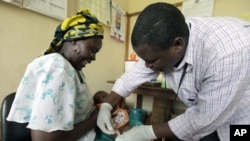A new report finds malaria control programs have saved hundreds of thousands of lives during the past decade. The World Health Organization, which has just published its World Malaria Report 2010, says malaria deaths could end by 2015 if the gains being made are maintained.
WHO says investing in malaria control programs brings results. And, it says results during the past two years have been spectacular.
The report says that between 2008 and 2010, enough insecticide-treated mosquito nets have been provided to protect more than 578 million people at risk of malaria in sub-Saharan Africa.
In addition, WHO Director-General Margaret Chan said the number of people protected from malaria by indoor residual spraying rose to 75 million, or 10 percent of the population at risk, in 2009.
"Worldwide, the estimated number of malaria deaths dropped from the nearly one million in the year 2000 to 781,000 in 2009," said Chan. "Eleven of Africa's 43 endemic countries are now reporting reductions of greater than 50 percent in either confirmed malaria cases or deaths over the past decade. Outside Africa, the malaria map is shrinking as more and more countries eliminate malaria from their territory."
Dr. Chan says each country that eliminates malaria benefits all others, but most especially, its immediate neighborhoods.
Another important tool in the fight against malaria is artemisinin-based combination therapies. This drug is proving to be extremely effective against malaria.
Unfortunately, resistance against ACTs, as it is known, has been found along the Cambodia-Thailand border. This is causing a lot of anxiety among health officials. They note that artemesinin is the only effective treatment available against malaria.
Dr. Chan says the World Health Organization is taking steps to try to prevent resistance from growing. She said that earlier this year, the World Health Organization recommended that all suspected cases of malaria be confirmed by a diagnostic test before anti-malarial drugs are administered.
"It is no longer appropriate to assume that every African child with a fever has malaria and needs anti-malarial treatment. Inexpensive, quality-assured, rapid diagnostic tests are now available. And that can be used right down to the community level. It is important to highlight the point that using these diagnostic tests can cut down the old way of prescribing ACT's and hence guard against the emergence of resistance."
The World Health Organization says it is extremely hopeful that clinical trials of a new vaccine - known as RTS,S - will prove successful. It says phase three clinical trials of the vaccine are taking place in 11 sites in seven different African countries.
It estimates that 16,000 infants will have been tested by the time the full trials end in 2014.
The World Health Organization says funding for malaria control programs, until recently, has been very good. Unfortunately, it says, contributions this year have leveled off and the amounts pledged fall far short of needs.
To maintain progress in the fight against malaria, it says more than $6 billion is required for 2010.




